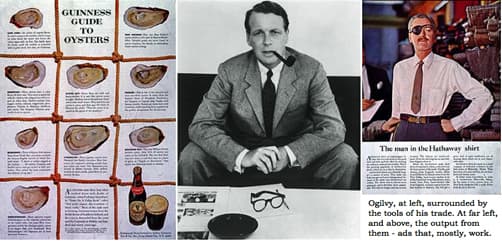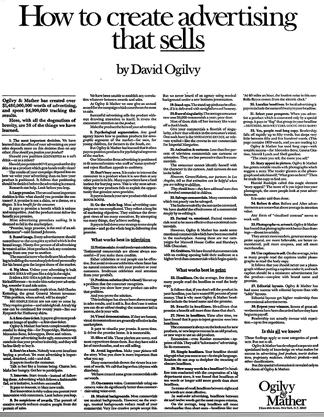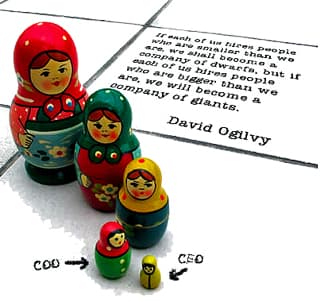A debt to the master: the Ogilvy effect
Part two of SOFII’s tribute to ‘the pope of advertising’, David Ogilvy.
- Written by
- Ken Burnett
- Added
- June 03, 2012

When the advertising and communications agency that I founded in 1982 opened its doors for business, its proprietor – me – would most likely have been found sitting on the front doorstep of the terraced Victorian house that was its first office with his nose buried in another, earlier, book by David Ogilvy, Confessions of an Advertising Man. It was my bible, though equally likely at that time, or perhaps a bit later, I’d be found engrossed in the classic that Christiana reviews at the start of this feature. I never met the great man and I’m fairly sure I wouldn’t have liked him if I had, but to say Ogilvy influenced me would be a bit like saying that Scotsmen are occasionally affected by whisky. To call this a massive understatement is, in itself, a massive understatement. Back then I was so immersed in the wisdom of what he was saying that I would have highlighted at least three paragraphs on every page. Truth is, I modelled the best years of my business life on the sayings of this man. And I prospered as a direct result.

 View original image
View original image
Ogilvy was a real guru, from back when advertising was an interesting and enjoyable part of our lives. One of my favourite, oft-recycled Ogilvy-isms is,
‘You can’t save souls in an empty church’.
There’s nothing religious about this saying, though the metaphor is surprisingly apt. What Ogilvy means is, if people aren’t listening you have no chance to convince them. So if you want your ad (or direct mail pack, or annual report, or whatever) to work, your message to get across, you must first make sure people will be attracted into it and can easily get to it. That’s why readability and use of type matters. It’s why letter structure and layout matters, it’s why understanding your reader matters. It’s why, for fundraisers, effective communication perhaps matters more than anything else.
But rather than subject SOFII’s readers to my interpretations of the great man’s words, here’s just a few of his original sayings to think about.
‘It takes a big idea to attract the attention of consumers and get them to buy your product. Unless your advertising contains a big idea, it will pass like a ship in the night. I doubt if more than one campaign in a hundred contains a big idea.’
‘Search your parks in all your cities, you’ll find no statues of committees.’
Over the years, that last one has come in particularly handy, for me.
‘In the modern world of business, it is useless to be a creative, original thinker unless you can also sell what you create.’
This is often paraphrased as, ‘If it doesn’t sell, it isn’t creative.’ Very useful, that.
‘Every advertisement is part of the long-term investment in the personality of the brand.’
He also gave the world timeless advertising lines, including the one that more than any other made him famous, for Rolls-Royce cars.
‘At 60 miles an hour the loudest noise in this new Rolls-Royce comes from the electric clock.’
(Though controversially, it is claimed that Ogilvy plagiarised this line, from a 1933 ad for an entirely different car, the short-lived Pierce Arrow.)
‘We all have a tendency to use research as a drunkard uses a lamppost -- for support, but not for illumination.’
‘Always hold your sales meetings in rooms too small for the audience, even if it means holding them in the WC. “Standing room only” creates an atmosphere of success, as in theatres and restaurants, while a half-empty auditorium smells of failure.’

‘When someone is made the head of an office in the Ogilvy & Mather chain, I send him (or her, presumably? Ed.) a Matrioshka doll from Gorky (Russian dolls inside dolls). If he has the curiosity to open it, and keep opening it until he comes to the inside of the smallest doll, he finds this message, “If each of us hires people who are smaller than we are, we shall become a company of dwarfs. But if each of us hires people who are bigger than we are, we shall become a company of giants.”.’
Famously and entirely erroneously, the above quote is apparently taken quite literally by many people, who imagine they are being urged to hire people taller and bigger than themselves. Foolish, perhaps, though over the years this must have led to many great company basketball teams.

‘The consumer isn’t a moron; she is your wife...’
OK, the line above is not a very politically correct thing to say these days. But, the big O almost certainly wasn’t very PC, just perceptive. He went on to say,
‘You insult her intelligence if you assume that a mere slogan and a few vapid adjectives will persuade her to buy anything. She wants all the information you can give her.’
‘The pursuit of excellence is less profitable than the pursuit of bigness. But it can be more satisfying.’
‘I don’t know the rules of grammar. If you’re trying to persuade people to do something, or buy something, it seems to me you should use their language.’
And finally, one I’m sure few would dispute, though many might fail to realise that they are the people he’s describing.
‘Our business is infested with idiots who try to impress by using pretentious jargon.’
Most of all, these sayings illustrate that Ogilvy was a great observer. So almost everything he said was perceptive and instructive, even the things he got wrong.
Oh David Ogilvy, when will we see your likes again? Sadly, as the great man passed away in July 1999, we will never read Ogilvy on Internet Advertising, or Ogilvy on Mobile Phone Messaging, or Ogilvy on Twitter. Our loss, I think.
© Ken Burnett 2009


















